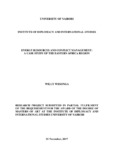| dc.description.abstract | This thesis argues that mismanagement of extraction of energy resources (oil and gas) is a source of conflict in African states. The issue that this thesis seeks to address is how the East Africa region can effectively manage its oil and gas resources to mitigate conflict which has bedevilled the African continent termed as a ‘resource curse’ or leading to the ‘Dutch disease’. The overarching objective is to establish the energy resource and conflict management in the Eastern Africa region. The specific objectives of the study are examining the link between oil and conflicts in Africa, the discovery of oil and gas in the Eastern Africa region and the policies which the states in the region need to put in place to mitigate the oil resource curse. The study sought to interrogate the following 1) what is the linkage between oil and conflicts in Africa, 2) what has been the impact of the discovery of oil in the East African region and 3) what policy measures are being put in place to manage the oil and gas extraction so that it does not lead to conflict. The assumptions here are that without proper management of the oil and gas extractives in the East Africa region it will lead to greed and grievances in the population and hence conflict. In addition functionalism theory also informs that if the states in the region do not corporate in the building of infrastructure to support the extractive industry the costs will be quite huge leading to loses. The academic and policy justification is to explore methods for optimal usage of the oil and gas and add to the existing policy to mitigate the conflict and enhance development in the East African region. The contention here is that oil and gas feeds into the resource curse thesis and thus undermining development, regional and global security. Such perspectives will be interrogated in this study. The hypothesis of this study is that there is a direct link between oil and gas and conflicts in Africa, weak policies have led to under exploitation and management of resources in Kenya and external actors have done much to alleviate resource based conflict. The oil discoveries in Turkana, Kenya, Mtwara gas in Tanzania and Lake Albert oil discoveries could be a source of conflict among the communities in the respective countries, between the communities and the interstate conflict on the construction of oil and gas pipelines in the region. Conflicts impact negatively on development. The study used the eclectic approach of analysing the oil and study conflict using the greed and grievances and functionalism theoretical frameworks to interrogate the conflict and provide policies and recommendations to mitigate the threat. Central to the grievances are the inter-ethnic or horizontal inequality. In addition the functionalism approach addresses the issue of coordination as a key function in state and community organization to mitigate conflict and keep peace and development. It contends that cooperation between the state and the communities enhances public participation in resource management thus conflict is addressed as all the stakeholders can contribute to the sharing of the natural resources in a state. The study has been conducted using desktop review of existing books, articles and periodicals. Key informants in the oil and gas industry and government officers were consulted on the research study and the informing obtained aim to be relevant for academic and policy recommendations. The study outline covered, chapter 1: introduction of the study; Chapter 2 the link between oil and conflicts in Africa; Chapter 3; the discovery of oil in the East African region; Chapter 4, Academic and policy lessons for the East African region, particularly Kenya and Chapter 5 Conclusions and recommendation. The study concludes that illegal oil and gas business underpins communal and ethnic conflicts in the region. Additionally, the weapons inflow empowers the communities and militias for accelerate violent conflicts. The study recommended that one valuable way to mitigate the potential contribution of oil and gas extraction to conflict is to institute clear codes of conduct and standards in relation to social and environmental outcomes. | en_US |



